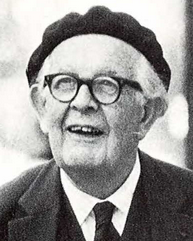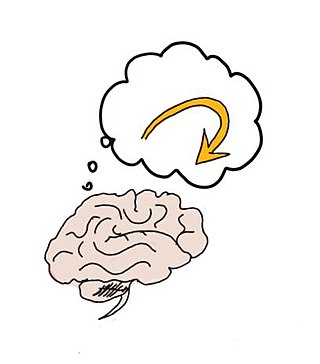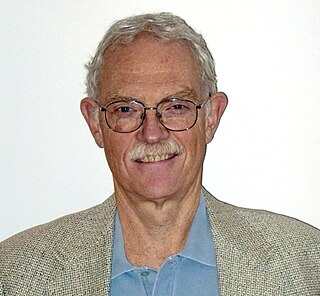Related Research Articles
Cognitive psychology is the scientific study of mental processes such as attention, language use, memory, perception, problem solving, creativity, and reasoning. Cognitive psychology originated in the 1960s in a break from behaviorism, which held from the 1920s to 1950s that unobservable mental processes were outside the realm of empirical science. This break came as researchers in linguistics and cybernetics, as well as applied psychology, used models of mental processing to explain human behavior. Work derived from cognitive psychology was integrated into other branches of psychology and various other modern disciplines like cognitive science, linguistics, and economics. The domain of cognitive psychology overlaps with that of cognitive science, which takes a more interdisciplinary approach and includes studies of non-human subjects and artificial intelligence.

Developmental psychology is the scientific study of how and why humans grow, change, and adapt across the course of their lives. Originally concerned with infants and children, the field has expanded to include adolescence, adult development, aging, and the entire lifespan. Developmental psychologists aim to explain how thinking, feeling, and behaviors change throughout life. This field examines change across three major dimensions, which are physical development, cognitive development, and social emotional development. Within these three dimensions are a broad range of topics including motor skills, executive functions, moral understanding, language acquisition, social change, personality, emotional development, self-concept, and identity formation.
Educational psychology is the branch of psychology concerned with the scientific study of human learning. The study of learning processes, from both cognitive and behavioral perspectives, allows researchers to understand individual differences in intelligence, cognitive development, affect, motivation, self-regulation, and self-concept, as well as their role in learning. The field of educational psychology relies heavily on quantitative methods, including testing and measurement, to enhance educational activities related to instructional design, classroom management, and assessment, which serve to facilitate learning processes in various educational settings across the lifespan.

Jean William Fritz Piaget was a Swiss psychologist known for his work on child development. Piaget's theory of cognitive development and epistemological view are together called genetic epistemology.

Cognition is the "mental action or process of acquiring knowledge and understanding through thought, experience, and the senses". It encompasses all aspects of intellectual functions and processes such as: perception, attention, thought, imagination, intelligence, the formation of knowledge, memory and working memory, judgment and evaluation, reasoning and computation, problem-solving and decision-making, comprehension and production of language. Cognitive processes use existing knowledge to discover new knowledge.

Albert Bandura was a Canadian-American psychologist. He was a professor of social science in psychology at Stanford University.

Jerome Seymour Bruner was an American psychologist who made significant contributions to human cognitive psychology and cognitive learning theory in educational psychology. Bruner was a senior research fellow at the New York University School of Law. He received a BA in 1937 from Duke University and a PhD from Harvard University in 1941. He taught and did research at Harvard University, the University of Oxford, and New York University. A Review of General Psychology survey, published in 2002, ranked Bruner as the 28th most cited psychologist of the 20th century.

Constructivism in education is a theory that suggests that learners do not passively acquire knowledge through direct instruction. Instead, they construct their understanding through experiences and social interaction, integrating new information with their existing knowledge. This theory originates from Swiss developmental psychologist Jean Piaget's theory of cognitive development.

Piaget's theory of cognitive development, or his genetic epistemology, is a comprehensive theory about the nature and development of human intelligence. It was originated by the Swiss developmental psychologist Jean Piaget (1896–1980). The theory deals with the nature of knowledge itself and how humans gradually come to acquire, construct, and use it. Piaget's theory is mainly known as a developmental stage theory.
Cognitive development is a field of study in neuroscience and psychology focusing on a child's development in terms of information processing, conceptual resources, perceptual skill, language learning, and other aspects of the developed adult brain and cognitive psychology. Qualitative differences between how a child processes their waking experience and how an adult processes their waking experience are acknowledged. Cognitive development is defined as the emergence of the ability to consciously cognize, understand, and articulate their understanding in adult terms. Cognitive development is how a person perceives, thinks, and gains understanding of their world through the relations of genetic and learning factors. There are four stages to cognitive information development. They are, reasoning, intelligence, language, and memory. These stages start when the baby is about 18 months old, they play with toys, listen to their parents speak, they watch TV, anything that catches their attention helps build their cognitive development.

Metacognition is an awareness of one's thought processes and an understanding of the patterns behind them. The term comes from the root word meta, meaning "beyond", or "on top of". Metacognition can take many forms, such as reflecting on one's ways of thinking, and knowing when and how oneself and others use particular strategies for problem-solving. There are generally two components of metacognition: (1) cognitive conceptions and (2) cognitive regulation system. Research has shown that both components of metacognition play key roles in metaconceptual knowledge and learning. Metamemory, defined as knowing about memory and mnemonic strategies, is an important aspect of metacognition.
David Elkind is an American child psychologist and author.
Domain-general learning theories of development suggest that humans are born with mechanisms in the brain that exist to support and guide learning on a broad level, regardless of the type of information being learned. Domain-general learning theories also recognize that although learning different types of new information may be processed in the same way and in the same areas of the brain, different domains also function interdependently. Because these generalized domains work together, skills developed from one learned activity may translate into benefits with skills not yet learned. Another facet of domain-general learning theories is that knowledge within domains is cumulative, and builds under these domains over time to contribute to our greater knowledge structure. Psychologists whose theories align with domain-general framework include developmental psychologist Jean Piaget, who theorized that people develop a global knowledge structure which contains cohesive, whole knowledge internalized from experience, and psychologist Charles Spearman, whose work led to a theory on the existence of a single factor accounting for all general cognitive ability.
Infant cognitive development is the first stage of human cognitive development, in the youngest children. The academic field of infant cognitive development studies of how psychological processes involved in thinking and knowing develop in young children. Information is acquired in a number of ways including through sight, sound, touch, taste, smell and language, all of which require processing by our cognitive system. However, cognition begins through social bonds between children and caregivers, which gradually increase through the essential motive force of Shared intentionality. The notion of Shared intentionality describes unaware processes during social learning at the onset of life when organisms in the simple reflexes substage of the sensorimotor stage of cognitive development do not maintain communication via the sensory system.

Hans Gerhard Fürth or Hans G. Furth was a Professor emeritus in the Faculty of Psychology of the Catholic University of America in Washington, D.C.
Katherine Nelson was an American developmental psychologist, and professor.

Juan Pascual-Leone is a developmental psychologist and founder of the neo-Piagetian approach to cognitive development. He introduced this term into the literature and put forward key predictions about developmental growth of mental attention and working memory.
Patricia Hackney Miller is a developmental psychologist known for her research on cognitive development during early childhood. She holds the position of Professor of Psychology at San Francisco State University.
Epistemic cognition, sometimes known as epistemological beliefs, or personal epistemology, is "cognition about knowledge and knowing", an area of research in the learning sciences and educational psychology. Research into epistemic cognition investigates people's beliefs regarding the characteristics of knowledge and knowing—as distinct from thinking or believing in general—and the impact of this on learning.

Henry M. Wellman is an American psychologist who studies child development. He is the Harold W. Stevenson Collegiate Professor of Psychology at the University of Michigan. Wellman is especially known for his work on theory of mind. He served on the faculty of Arizona State University for two years before joining the Michigan faculty in 1977. He was inducted as a Fellow of the American Academy of Arts and Sciences in 2012.
References
- 1 2 "John Hurley Flavell". American Academy of Arts & Sciences. November 9, 2023. Retrieved December 20, 2023.
- ↑ PP, Noushad (July 20, 2008). "Cognitions about Cognitions: The Theory of Metacognition". Education Resources Information Center. ERIC ED502151.
- ↑ Schraw, Gregory; Nietfeld, John; et al. (2002). "Metamemory". In Guthrie, James W. (ed.). Memory. Encyclopedia of Education. Vol. 5 (2nd ed.). Gale. pp. 1588–1613. Gale CX3403200401.
- 1 2 3 4 Flavell, John H. (1955–1973). John Hurley Flavell papers. University of Minnesota.
- 1 2 3 4 5 Alic, Margaret. "Flavell, John Hurley". Gale Encyclopedia of Psychology. Cengage – via Encyclopedia.com. Other version available at Gale CX3631000294.
- ↑ "Researcher in Profile: John Flavell on Inner Speech". Bing Nursery School. Stanford University. August 1, 2003. Retrieved December 20, 2023.
- ↑ "John Flavell". Department of Psychology. Stanford University . Retrieved December 20, 2023.
- ↑ "John Flavell Curriculum Vitae" (PDF)– via Society for Research in Child Development.
- ↑ "Awards for Distinguished Scientific Contributions: John H. Flavell". American Psychologist. 40 (3): 291–295. March 1985. doi:10.1037/h0092192. ISSN 1935-990X.
- ↑ Livingston, Jennifer A. (2003). "Metacognition: An Overview" (PDF). S2CID 141414652. ERIC ED474273. ResearchGate:234755498.
- ↑ Lupeanu, Doru (October 13, 2022). "Metacognition in 10 points". KnowledgeOne. Retrieved December 20, 2023.
- ↑ "Metacognition in Psychology | Overview & Examples". Study.com. Retrieved December 19, 2023.
- ↑ Cooper, Sunny. "John Flavell: Metacognition Theory". Theories of Learning in Educational Psychology. Archived from the original on March 25, 2016. Also archived as Theories of Learning in Educational Psychology.
- ↑ Trautner, Hanns Martin; Gervai, Judit; Németh, Rita (May 2003). "Appearance–reality distinction and development of gender constancy understanding in children". International Journal of Behavioral Development. 27 (3): 275–283. doi:10.1080/01650250244000362. ISSN 0165-0254. S2CID 145685387.